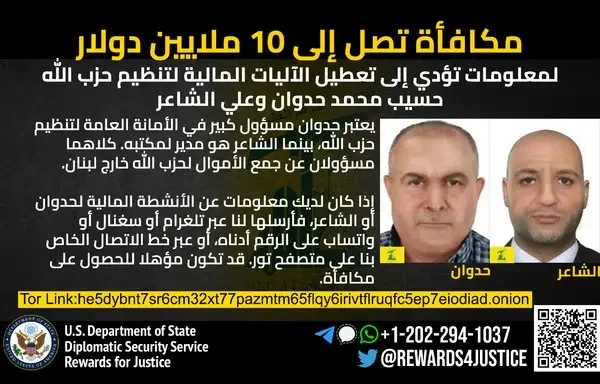Security
Hizbullah's global financial network funds criminal activities
Hezbollah’s vast funding network, bolstered by the Iranian regime’s backing and other illicit activities, has strengthened its military capabilities while deepening Lebanon’s economic collapse.

By Nohad Topalian |
Hizbullah has built an extensive global network of financial backers to sustain its criminal activities, including drug trafficking, arms smuggling, and money laundering.
This network works hand in hand with direct state support, especially from Iran’s Islamic Revolutionary Guard Corps (IRGC), which provides funding, training, and weapons.
For years, the IRGC has funneled financial support to Hizbullah, enabling it to expand its military arsenal and entrench its influence.
These efforts have also contributed to the erosion of Lebanon’s economy through the creation of a parallel financial system.
Experts pointed to the Lebanon-based Dar al-Salam Travel and Tourism Company as a key front used to raise funds.
Founded by three financial facilitators, the company came under US Treasury Department sanctions in January 2022.
The Office of Foreign Assets Control (OFAC) blacklisted facilitators Adel Diab, Ali Mohammad Daoun, and Jihad Salem Alameh, along with Dar al-Salam, for their role in funding Hizbullah.
Adel Diab, a Hizbullah member and Lebanese businessman, used his company to channel funds to the group, according to the Treasury Department.
Diab co-owned assets with Ali al-Shair, an assistant to fundraiser Hasib Muhammad Hadwan, a member of Hizbullah’s General Secretariat who worked closely with slain Hizbullah leader Hassan Nasrallah.
In June 2022, the US State Department’s Rewards for Justice program offered up to $10 million for information on Hadwan and al-Shair, both key figures in securing funding abroad.
Illegal activities
"Assisted by the IRGC, Hizbullah's criminal activities have severely damaged Lebanon, leading directly to the collapse of the economy and the creation of a detrimental parallel financial system," retired Brigadier General George al-Saghir told Al-Fassel.
"To finance its criminal operations, Hizbullah relied on a network that leveraged the Lebanese Shia diaspora," he said. "Facilitators and supporters were crucial in collecting funds and donations, funneling them through the global financial system, and eventually transferring them to the group."
"The network operates in South America and Africa, concentrating its criminal efforts including drug trafficking, arms smuggling, money laundering, and currency counterfeiting," he said.
"The Dar Al-Salam Tourism and Travel company maintained close ties with Hizbullah leader Hassan Nasrallah," said Hassan Qutb, director of the Lebanese Center for Research and Consulting.
"The company's offices are located in Ruwais in Beirut's southern suburbs, al-Mazraa in Beirut, and Nabatieh in the south," he added.
"The company organizes Hajj and Umrah pilgrimages to Mecca, Saudi Arabia, as well as visits to Shia holy shrines in Iran and Iraq. The primary goal of running these trips is to collect cash and transfer it to Lebanon [Hizbullah]," Qutb said.